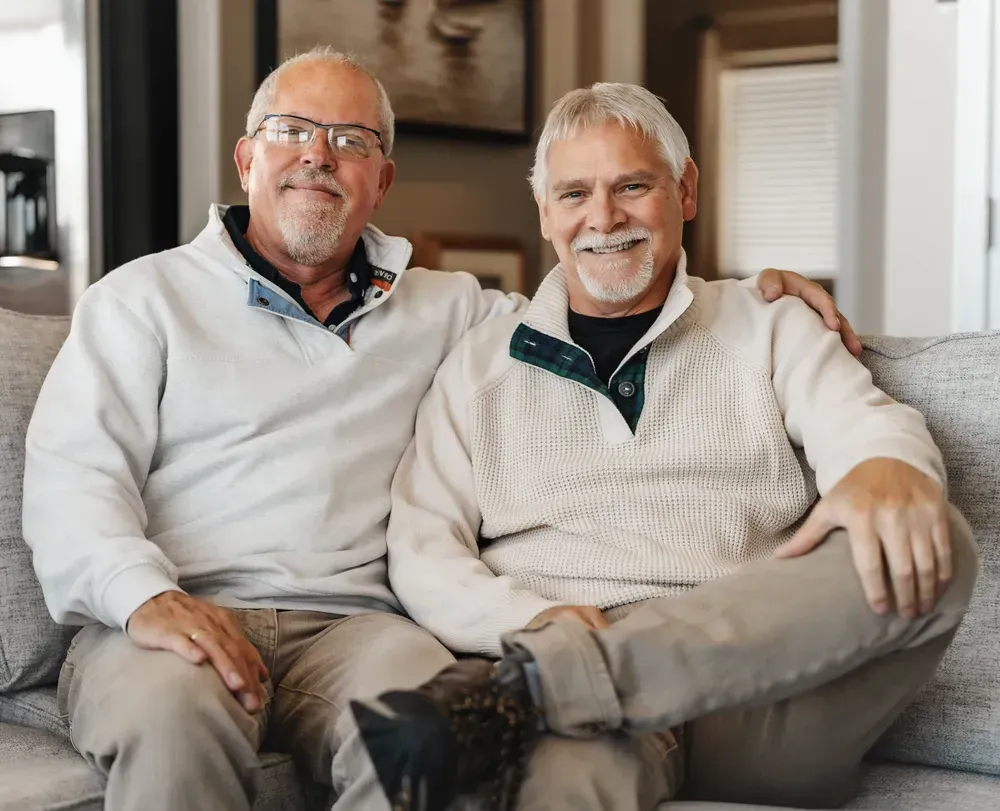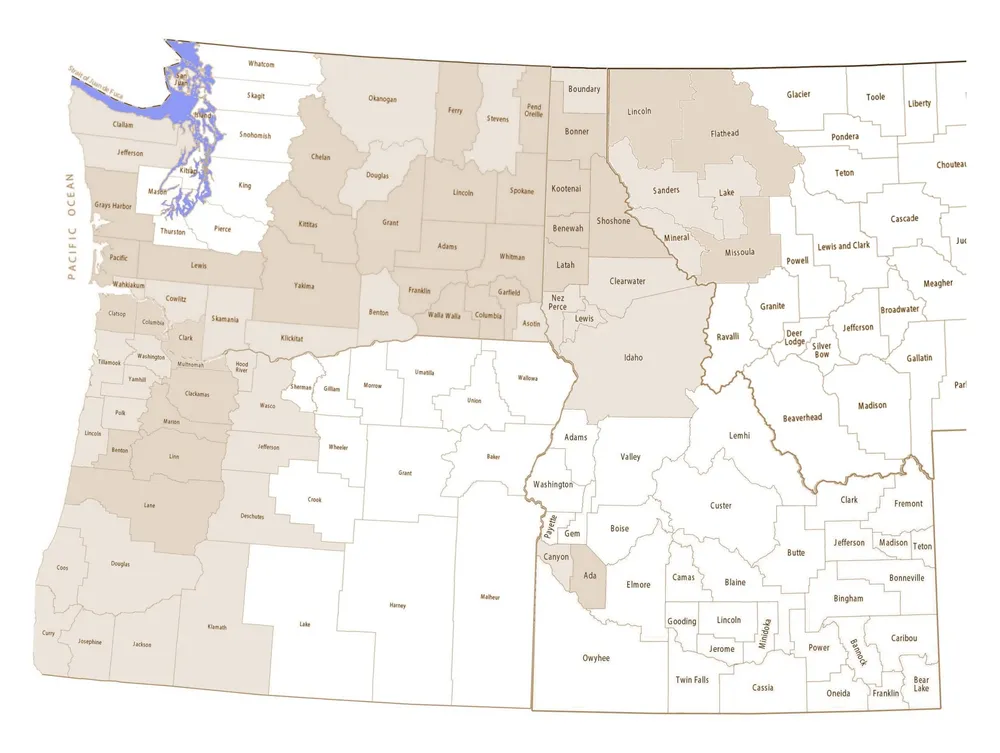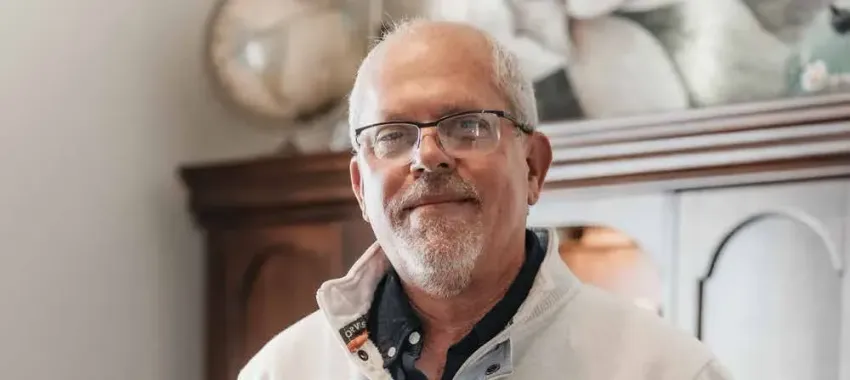Mt. Rainier or Brokeback Mountain? They may as well be the same at Stonewall News Northwest, in which publisher Mike Schultz showcases the voices and stories of rural LGBTQIA+ communities.
For Schultz, the point is not just about setting but about voice: making sure Queer communities in rural areas of the Northwest are seen and heard.
It’s no surprise the woods hold many stories. Hundreds make the trek every week to climb, swim, backpack, and share stories on the peaks, which are an escape for so many here in Seattle. Yet they also hold so many of the stories of people already living there. There’s simplicity there, where people can live freely and authentically.
“These are places where there are shared values, straight or Queer, encompass getting to know and support neighbors,” said Schultz. “A strong sense of grounding and gratitude, relationships, trust and honor. And not being in such a rush all the time.”
Schultz's story
Schultz’s story is similar. Growing up in suburbs and having lived in Sacramento and Spokane, he learned the value of simple pleasures as life’s treasures early on.
Adopted into a religious family, he also grew up watching his father, a Lutheran minister, risk his standing by supporting the ordination of Lesbian ministers in the 1980s, and his mother, a teacher, standing against stigma by collecting donations for AIDS relief when few others would.
“Those very visible actions of principled courage and compassion left indelible impressions on me of what a caring humanity should be like,” said Schultz.
Their example instilled in him a lifelong belief in equality, inclusion, and the power of principled action. Over the years, Schultz has carried that forward through his publishing work, including Stonewall, Q View Northwest, and Coastal Pride.

Finding love
Schultz has a lot of love in his life, including a love for history, which he shares with his beloved.
In 2006, he met his partner Steven online when the latter lived in Bellingham. Six months later, Steven moved to Spokane to be with Schultz, and they purchased the historic Muzzy Mansion to restore and preserve the property.
Since then the couple has worked hard to maintain more history, like Seattle’s classic motor yachts Itineras and Luxuria. Schultz later bought two houses and a vacant lot in Ocean Shores. It was from there that he started Coastal Pride to cover community from a Queer perspective.
Stonewall News
Although rural communities may see fewer social pressures that a city may bring, that doesn’t necessarily always make things easier for the Queer communities living there.
Schultz says they often suffer a “vacuum of relative isolation.” That isolation inspired Stonewall News Northwest, which began Spokane in 1992 as Stonewall News Spokane, founded by Larry Stone to give the Inland Northwest’s LGBTQIA+ community a dedicated voice. In 1995, John Deen purchased the paper and renamed it Stonewall News Northwest to reflect a broader regional reach across Eastern Washington and North Idaho. Over the years, it became both a vital news source and a chronicle of Queer life, activism, and culture in the region.
In 2005, Schultz purchased the publication, carrying forward its legacy while adding his own vision for preserving and expanding Queer media in the Northwest until 2007, at which point he went on to publish Q View Northwest.
In 2023, Schultz purchased the SGN from Angela Cragin, daughter of longtime publisher George Bakan. During his eight-month tenure and beyond, he pursued his passion for preserving the paper’s digital and physical archives. In mid-2024, Schultz sold the publishing arm of the SGN to current publisher Renee Raketty.
This February, Schultz relaunched Stonewall as a printed monthly counterweight to political hostility and a platform for rural Queer lives. Stonewall serves communities from Eastern Washington (Spokane, Pullman, Walla Walla, and the Tri-Cities) all the way to North Idaho (including Coeur d’Alene, Moscow, and Sandpoint).
Stonewall now works with the SGN, sharing news and information, and also partners with FaVS News and RANGE farther inland. “There's something significant to be said about how our nuanced publications function in this hostile sociopolitical climate by working together as allies — a refreshing (and likely necessary) change from the past when publishers and publications were isolated and territorial,” Schultz said.
“This Stonewall reboot arrives at a perilous time,” he added. “Volleys of executive hate-grenade edicts are being tossed out the White House day after day, many ignoring the Constitution and due process. Over five hundred anti-LGTBQ+ bills (and counting) are now in state legislatures across the country.”
Schultz sees it not as a business with rigid goals but as a living project that grows with the people it represents — whether amplifying rural Queer life, celebrating local history, or spotlighting new expressions of pride. For him, the work is less about building an institution than about honoring his parents’ example: extending love, dignity, and recognition to those who deserve to be seen and celebrated.
The SGN spoke with Schultz about his background, the revival of Stonewall, and why the stories of woods still are vital to share.

Nova Berger: You’ve been involved in Queer publishing for decades. What first drew you into it?
Mike Schultz: Preserving our Queer history and voice as a community was paramount in my choice to buy Stonewall Publishing Inc. in 2005 from the former publisher, who was dying of lung cancer. The strong possibility of Stonewall’s chronicled local Queer culture and history since 1992 being lost to time was incomprehensible to me. With no prior publishing experience, I learned what was needed and, with the help of staff and the community, we picked up where the former publisher was leaving off.
NB: You grew up in both California and Washington. How did that shape your sense of what a Queer publication should be?
MS: Growing up in tiny Caruthers, California, then the suburbs of Sacramento, and later Spokane, Washington, shaped a more rural sense of home and community. Shared values — straight or Queer — meant getting to know and support neighbors. A strong sense of grounding and gratitude, relationships, trust, and honor. And not being in such a rush all the time.
NB: A lot of Queer media is city-based. What makes the PNW countryside a unique place to tell Queer stories?
MS: Rural communities are generally underserved. Queer people in rural places often live in a vacuum of relative isolation. Visibility is harder to come by, community is harder to sustain. But there’s also a freedom — less pressure to conform to urban standards, more opportunity to simply be. That’s why Stonewall matters: to connect those dots and create a conduit of empowerment.
NB: Why relaunch Stonewall now?
MS: I don’t think there’s ever a bad time to do what we can to foster open dialogue, disseminate information, and create unity. But the impetus to relaunch Stonewall in February of this year was a direct counter to the result of the last election. Right out of the gate, this administration has been aggressive and brutal in its efforts to suffocate equality, inclusiveness, and basic human dignity. I’m not able to sit on the sidelines in the face of that assault.
NB: What kinds of stories go untold in rural LGBTQIA+ communities?
MS: Everything from Pride events in small towns to the everyday ways people show up for one another. One of our most popular features this year was the PNW Pride Guide, which listed nearly 50 rural Pride events across Washington, Oregon, and Idaho. Pulling all that together made clear how vibrant these communities are — even if they’re often overlooked.
NB: You and your husband Steven have literally hauled print editions across snowy roads. What keeps you motivated?
MS: [laughs] It’s the gritty side of publishing. But for me, it’s about facilitating — maintaining a conduit of community empowerment through current and historical information. Activism isn’t only about protests and demonstrations. Even the sheer act of being our authentic selves is considered rebellious by some. Printing and delivering those papers is activism too.
NB: The name “Stonewall” carries a lot of weight. What does it mean to you in this Northwest context?
MS: The Stonewall riots in 1969 cemented a legacy of struggle and resistance. With hurled bricks and tiaras, Queer people shouted to the world: “We’ve had enough.” That message applies everywhere — urban or rural. Here in the Northwest, it’s echoed in Pride celebrations held in the rain, in logging towns, in fields and community halls. Rural Pride events in general — in their own uniquely individual way — are defiant and proud.
NB: You’ve been at this since the 1990s. How does it feel to be ushering Queer media into a new generation?
MS: It’s a privilege. As a society, how we share information will always evolve, but for me, serving in this way — preserving, informing, supporting, empowering, elevating — continues to be my calling.
Through Stonewall News Northwest, Schultz is carrying forward a legacy rooted in both history and geography: one that insists that rural Queer lives are worthy not just of preservation but of celebration. Out in the woods, the voices are loud and clear.
“We are all connected as one humanity,” he said. “We all bear this cross of resistance: to publicly stand up and fight this invasion of hate, to push the pendulum of humanity back toward inclusion, dignity, and equality. And we must do it now.”
Support the Seattle Gay News: Celebrate 51 Years with Us!
As the third-oldest LGBTQIA+ newspaper in the United States, the Seattle Gay News (SGN) has been a vital independent source of news and entertainment for Seattle and the Pacific Northwest since 1974.
As we celebrate our 51st year, we need your support to continue our mission.
A monthly contribution will ensure that SGN remains a beacon of truth and a virtual gathering place for community dialogue.
Help us keep printing and providing a platform for LGBTQIA+ voices.
How you can donate!
Using this link: givebutter.com/6lZnDB
Text “SGN” to 53-555
Or Scan the QR code below!



